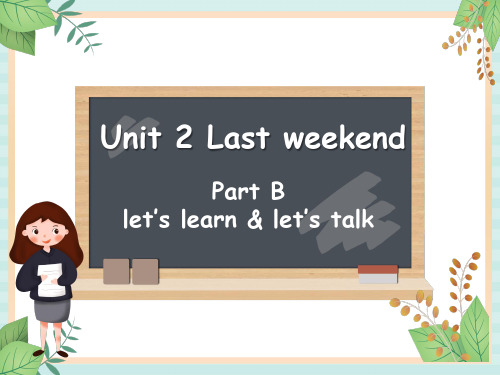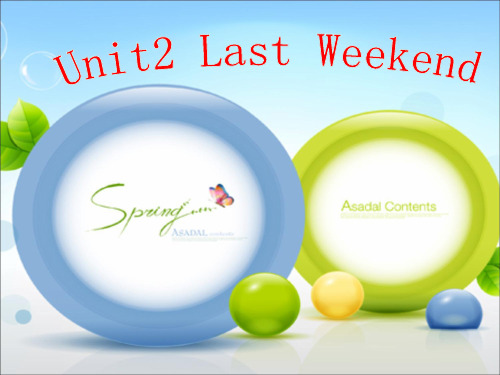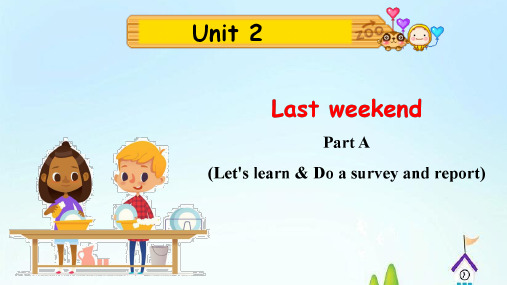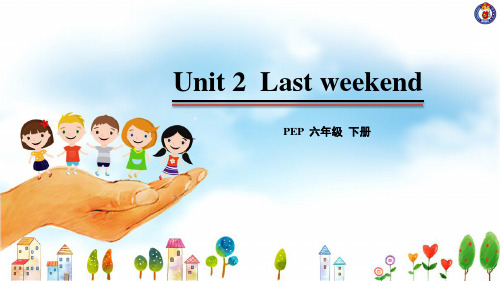六年级英语下册第二单元课件
合集下载
六年级英语下册 Unit 2 Part B 课件 人教PEP版

A. He slept. B. He read a new film magazine. 2. Are Wu Binbin and John going to meet
Amy together? A. Yes, they are.
B. No, they aren’t.
Wu Binbin: What did you do last weekend,
Alice in Wonderland
read a book
读书
read
读
Look and read
在……之前
昨天 yesterday today
一 二三四 五 六 日一 二 三 四 五六日
MON. TUE. WED. THUR. FRI. SAT. SUN. MON. TUE. WED. THUR. FRI. SAT. SUN.
妈妈想要我打扫房间。 Mom wants me to clean the room.
buy
① buy sth. 买某物 ② buy sb. sth. 给某人买某物 ③ buy sth. for sb. 给某人买某物
翻译:爸爸给我买了一本书。 My father buys a book for me. My father buys me a book.
John Amy
For example:
What did they do How was their last weekend? last weekend?
John
had a cold, stayed at home, slept
bad/
not
good…
Amy
read a film magazine
根据图片判断Yes /no
六年级下册英语课件M5U2 _外研版(三起) (共24张PPT)

3.吃晚饭 ____e_a_t_d_i_n_ner
12.门铃__d_o_o_r_b_e_ll
4.开始下雨___s_t_a_r_t _to__r_a_in
5.在空中_____in__th__e_sky
13.loudly(形容词)_lo_u_d__
ห้องสมุดไป่ตู้
6.做操______d_o__e_x_e_rcises
7.放风筝____f_ly__a_k_ite
eg: I have a book and you have a book, too.
Test She is flying s kite but Daming is riding a bike. 一、判断下列句子是(Y)否(N)并列句,并说明原因。
I’m reading a book. N In this photo,the sun is shining. N The birds are singing and the ducks are eating. Y He’s riding his bike, but it’s starting to rain. Y
3.You are___w_a_v_i_ng(wave)to say
goodbye.
4.It’s_s_t_a_rt_in_g_ (start) to rain.
5.I _a_m__g__o_in_g__to__g_o (go) to the park
tomorrow.
(will go)
看图完成句子:
_a_n__d_w__e_a_r_e_f_ly_i_n_g_k_i_t_e_s_, _to_o_.____
• She is writing her homework ,but the phone is ringing .
六年级英语下册第二单元课件

一般过去时
表示过去某个时间里发生的动 作或状态。动词要用过去式形 式。(通常在动词词尾加ed )
例:I watched TV yesterday . I played football last weekend .
on the weekend
play football watch TV clean the room wash clothes visit grandparents
【常见用法1】 TV show 【常见用法2】 children’s show 【例】 I watched some children’s shows
on TV.
March
日历
一 二三四 五
MON. TUS. WEN. THUR. FRI.
六日 一 二三四 五
SAT. SUN. MON. TUS. WEN. THUR. FRI.
表示过去的时间
last weekend last night last Monday yesterday the day before yesterday ……
What did you do+过去的时间 ?
I +表示过去动作的短语
1,watched TV 2,washed my clothes 3,cleaned the room 4,visited my grandparents 5,drank tea 6,watched some children’s shows on TV 7,did something else
六日
SAT. SUN.
11 12 13 14 15 16 17 18 19 20 21 22 23 24
last [lɑ:st] weekend [wi:kend]
人教版六年级英语下册第二单元课件.ppt

②含实义动词的一般过去时
肯定式
主语+动词过去式+其他.
否定式
主语+didn't(did not的缩写)+动词原形+其他.
一般疑问句 Did+主语+动词原形+其他?
肯定回答:Yes,主语+did. 否定回答:No,主语+didn't.
动词过去式的构成
①规则动词过去式的构成:
构成规则
一般在动词原形末尾+ed
③What did Mike do last weekend?
Task2:check the answers(核对答案)
①How was Mike's grandpa's weekend? It was good.
②What did his grandpa do last weekend? He stayed at home, drank tea and watched TV. ③What did Mike do last weekend? He watched TV,cleaned his room and washed his clothes.
Exercise
连词成句
1.your, how, weekend, was(?) __H_o_w__w_a_s_y_o_u_r_w__e_e_k_en_d_?___________ 2.at, your, home, I, grandma, stayed, with(.) ___I_s_t_a_y_e_d_a_t__h_o_m_e_w__it_h_m__y_g_r_a_n_d_m_a_._ st, did, you, what, do, weekend(?) __W__h_a_t_d_id__y_o_u_d_o__la_s_t_w__e_ek_e_n_d_?_____
人教PEP版六年级英语下册Unit2Last weekend PartA let's learn课件

My weekend
busy
cleaned room
cooked dinner
Let's talk(读对话完成下列问题)
1.John and Amy will go to the __________. 2.John wants to buy _________________. 3.The magazine talked about __________. 4.What did John do last weekend?______. 5.How do they get to the bookstore?
Read and complete the sentences . I (cook)__co_o_k_e_d_dinner last Monday . I (play)_p_la_y_e_d__football last weekend . I (like) __lik_e_d___the food yesterday . I (visit)__vi_s_it_e_d_my grandparents last weekend . I (stop) _s_to_p_p_e_d_to look at the flower . I (study)_s_t_u_d_ie_d_English last night .
Let's learn
Let's learn cleaned my room stayed at homewashed my clothes
watched TV
washed my clothes
Let's learn
stayed at home washed my clothes cleaned my room
冀教版小学六年级英语下册Unit 2单元复习课件

Again please 听力习题
Homework
1、描述自己早晨起床后的活动。 2、Everyone wants to be healthy and strong.怎样做才能保持身体健康呢? 写一写吧。
Thank you !
week month season year
星期 月 季节 年
Sentences
body
head 头 hair头发 face 脸 mouth 嘴巴 eye 眼睛 nose 鼻子 ear 耳朵 tooth 牙齿teeth
shoulder肩膀 arm 胳膊 hand 手 finger 手指 stomach 胃 肚子 leg 腿 foot脚 (复数feet) toe 脚指头
冀教版小学六年级英语下册 Review Unit 2
次数的表达
时间
once 一次 twice 两次 three times 三次
second 秒 minute 分钟 hour 小时 day 天
once a day 一天一次 twice a week 一周两次 three times a monter--always
before--after high高的--low低的
strong 健壮的--weak虚弱的
healthy健康的--ill生病的
短语
work hard have fun clean my bedroom brush one's teeth after school
dry the dishes on time 准时 get up wash one's face
It's good for you . It's bad for you . An apple a day keeps the doctor away . Exercise helps make your bady healthy and strong.
六年级下册英语第二单元课件

昨天晚上谁在教室里? _W__h_o _w__a_s in the classroom last night?
昨天你为什么迟到了? _W__h_y_ _w__e_re_ you late yesterday?
2. 特殊疑问词 + did + 动词原形 + 主语 +其他?
练习
上个周末你做了什么呢? _w_h_a_t_ _d_i_d_ you do last weekend?
I visited my grandparents last weekend. I always went swimming in summer.
动词过去式变化规则 1.一般在词尾加 —ed eg. clean – cleaned stay — stayed
2.词尾是e的加-d eg. live – lived hope – hoped
Unit 2 Last weekend
PEP 六年级 下册
Look at the pictures and understand.
They see a film today. They saw a film yesterday.
watch TV. watched TV
visit my parents. visited my parents.
watch — w__a_tc_h_e_d__ listen— _l_is_t_e_n_e_d_ visit— __v_is_i_te_d__
clean— c_l_e_a_n_e_d_ play— _p_l_a_y_e_d__ wash— _w_a_s_h_e_d_
3.末尾只有一个辅音字母的重读闭音节,先双写这个辅音字母, 再加-ed eg. stop – stopped plan — planned
昨天你为什么迟到了? _W__h_y_ _w__e_re_ you late yesterday?
2. 特殊疑问词 + did + 动词原形 + 主语 +其他?
练习
上个周末你做了什么呢? _w_h_a_t_ _d_i_d_ you do last weekend?
I visited my grandparents last weekend. I always went swimming in summer.
动词过去式变化规则 1.一般在词尾加 —ed eg. clean – cleaned stay — stayed
2.词尾是e的加-d eg. live – lived hope – hoped
Unit 2 Last weekend
PEP 六年级 下册
Look at the pictures and understand.
They see a film today. They saw a film yesterday.
watch TV. watched TV
visit my parents. visited my parents.
watch — w__a_tc_h_e_d__ listen— _l_is_t_e_n_e_d_ visit— __v_is_i_te_d__
clean— c_l_e_a_n_e_d_ play— _p_l_a_y_e_d__ wash— _w_a_s_h_e_d_
3.末尾只有一个辅音字母的重读闭音节,先双写这个辅音字母, 再加-ed eg. stop – stopped plan — planned
(人教PEP)六年级英语下册课件 unit2 完整版

道德是人类社会的一种重要意识形态是人们在社会生活实践中形成的并由经济基础决定以善恶为评价形式依靠社会舆论传统习俗和内心信念pair请加上你个性化的动作heshehas道德是人类社会的一种重要意识形态是人们在社会生活实践中形成的并由经济基础决定以善恶为评价形式依靠社会舆论传统习俗和内心信念headachehavetoothachesorehurtsmatter道德是人类社会的一种重要意识形态是人们在社会生活实践中形成的并由经济基础决定以善恶为评价形式依靠社会舆论传统习俗和内心信念hospitaldoctor
Unit 2 What’s the matter, Mike?
Lesson 1
•
• •
What’s your favourite fruit?
I like banana best.
•
• •
What’s your favourite fruit?
I like watermelon best.
•
• •
另外一个
win the match 赢得比赛 laugh at 嘲笑,笑话
New words
1.劳累的 4.高兴的 2.生气的 5.无聊的 3.兴奋的 6.伤心的
7.看起来
10.测试
8.旅行
9.失败,不及格
11.听见
重点短语
1. 看起来(看上去)高兴, 3. 语文考试不及格 5. 得流感 7. 头疼 9. 担心。。。 11. 吃点药 13. 呆在家里
2. 去旅游
4. 感觉不舒服
How does he feel? He feels bored.
happy tired
excited
angry bored sad
How does ______ feel?
Unit 2 What’s the matter, Mike?
Lesson 1
•
• •
What’s your favourite fruit?
I like banana best.
•
• •
What’s your favourite fruit?
I like watermelon best.
•
• •
另外一个
win the match 赢得比赛 laugh at 嘲笑,笑话
New words
1.劳累的 4.高兴的 2.生气的 5.无聊的 3.兴奋的 6.伤心的
7.看起来
10.测试
8.旅行
9.失败,不及格
11.听见
重点短语
1. 看起来(看上去)高兴, 3. 语文考试不及格 5. 得流感 7. 头疼 9. 担心。。。 11. 吃点药 13. 呆在家里
2. 去旅游
4. 感觉不舒服
How does he feel? He feels bored.
happy tired
excited
angry bored sad
How does ______ feel?
- 1、下载文档前请自行甄别文档内容的完整性,平台不提供额外的编辑、内容补充、找答案等附加服务。
- 2、"仅部分预览"的文档,不可在线预览部分如存在完整性等问题,可反馈申请退款(可完整预览的文档不适用该条件!)。
- 3、如文档侵犯您的权益,请联系客服反馈,我们会尽快为您处理(人工客服工作时间:9:00-18:30)。
根据Let’read中学过的短语写一 篇有关足球的小短文。 要求:短文中应涉及时间、 地 点以及have the ball kick the ball between…and pass to等短语。
They are happy.
They are bored.
hurt
tired
have a fever
have a cold have a toothache
angry
excited happy
have a headache
have a sore throat
sad
bored
A:
How are you ? You look so happy. B: Yes. I am excited. I am going on a big trip. What’s the matter with you? A: I have a sore throat. My nose hurts. B: I’m sorry to hear that.
3.Jack can’t play with his friends.he has nothing to do.
rry loves ice-cream.He is eating a big chocolate ice-cream.
It’s Saturday morning. The weather is fine.
一名学生扮演医生,另一名 学生扮演病人,医生边询问 病情边给病人开处方,增强 学生的口头语言表达能力.
Βιβλιοθήκη D: Good morning, … S: Good morning, doctor. D: What’s your name? S: My name is … D: What’s the matter? S: I feel sick. D: Do you have a headache? S: Yes. D: Do you have a fever? S: I don’t know. I feel very D: Do you have a sore throat? cold. D: Come to me and say “Aha” S: Yes. D: You have a cold. S: Aha… D: I’ll give you some S: Oh. What should I do medicine. Drink some water then? and stay at home for three days.
Now John has the ball.He passes it to Mike. Mike kicks the ball. It’s a goal!
得到球、控球
踢球
飞到 有些 Now Zhang Peng has the ball. He kicks it. The ball flies into John’s face! John is a little angry. But the ball bounces off his head. It flies into the goal. Another goal! How’s John feeling now? Guess! He’s so happy! Hooray! Class1 won the game. But Class 3 is not sad. They are laughing at John’s funny goal. 因……而发笑 弹起来,弹离
1.How do the students feel before the football game starts? They are excited. 2.How does John feel when the ball hits his head? He is a little angry. 3.How does Class 3 feel at the end of the game? Class 3 is not sad. They are laughing at John’s funny goal.
How’s John feeling now? Guess! He’s so happy!
Hooray! Class 1 won the game.
But Class 3 is not sad. They are laughing at John’s funny goal!
在……之间
It’s Sunday moring.The weather is fine.There is a football match between Class 1 and Class 3. Many students are watching .They are excited. 传递
There is a football match between Class 1 and Class 3.
Many students are watching.
They are excited.
John
Mike
He passes it to Mike.
He kicks it. The ball flies into John’s face!
1.Listen and number
5
2
3
4
1
1.I have a cold. I have a sore nose.
2.My throat hurts. I have a sore throat.
3.I hurt my hand.
4.I have a fever. I think I have the flu.
5.I feel sick. I have a headache.
2.Listen and number
2
1
4
3
1.Tom has a lot of homework.He goes to bed very late. 2.Mary has to say goodbye to her friends.
What's the matter? / What's wrong with him/ her?
He has a sore throat. She has a fever.
What's the matter? / What's wrong with him/her?
His leg hurts. He has a cold.
What's the matter? / What's wrong with him/ her?
He has a toothache. She has a headache.
How does he feel? / How is he?
He is tired.
He is excited.
How do they feel? / How are they?
